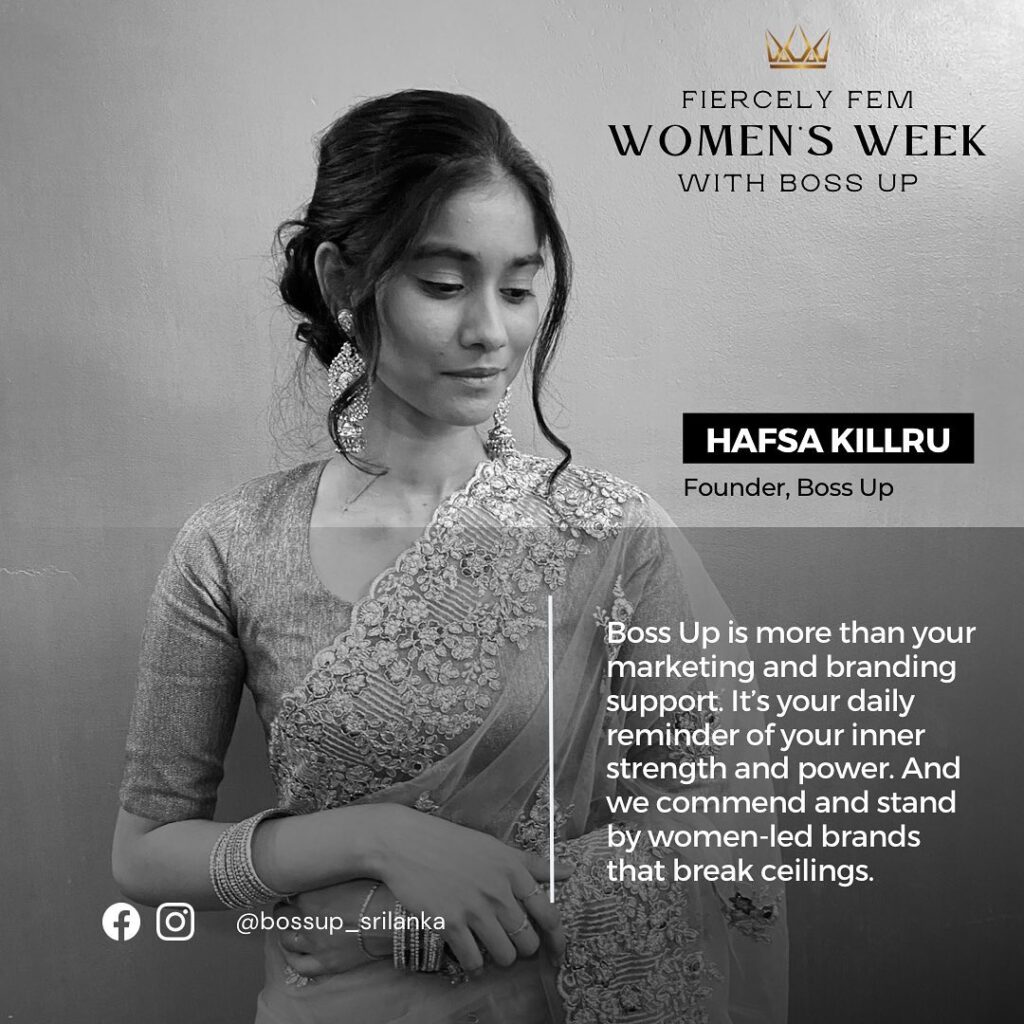
In a society where workplace policies often reflect outdated standards, a quiet revolution is taking place—led not by a corporation or multinational, but by a young woman who turned personal struggle into systemic change.
Meet Hafsa Killru, a 26-year-old entrepreneur and founder of Boss Up Sri Lanka, a dynamic marketing and content creation company that’s making waves for all the right reasons. With a Diploma in Psychology and a bachelor’s in business administration from the University of Bedfordshire, Hafsa began her journey as a freelance writer for a popular Sri Lankan wedding magazine at just 17. But her path didn’t stop at storytelling, she wanted to build something bigger, something that empowered others like her.
Boss Up was born out of rejection. After being turned down by over 20 companies in just three months in 2019, Hafsa channeled her frustration into purpose. She recognized a gap in empathetic, growth focused business solutions—especially during the uncertainty of the pandemic. By October 2020, she had launched Boss Up with a mission: empowering self-made entrepreneurs and redefining workplace culture through empathy, flexibility, and inclusion.
Fast forward 2.5 years, Boss Up has worked with nearly 100 brands locally and internationally—and now, it has become the first Sri Lankan company to formally offer menstrual leave to its employees.
At Boss Up, work-life balance isn’t a buzzword, it’s a foundation. In March 2023, during a casual conversation with a team member enduring period pain while rushing to meet deadlines, Hafsa had an epiphany. “We’re bleeding every month. Why are we expected to pretend we’re okay?” she asked. That one question led to a game-changing decision.
Two paid days off each month for menstruation, that’s the policy Hafsa implemented almost immediately. While international companies may offer three to ten menstrual leave days per year, Boss Up took a bold stance: honoring the recurring and often painful reality of menstruation by matching leave to the monthly cycle.
This was more than policy, it was a signal. A message that said: We see you. We understand. Take the time you need. We’ve got your back.
Menstruation isn’t just a biological event. It can bring intense pain, exhaustion, hormonal fluctuations, and in the case of conditions like PCOS (Polycystic Ovary Syndrome) or endometriosis, even debilitating symptoms. Expecting employees to push through that silently in the name of productivity is both unrealistic and inhumane.
By offering menstrual leave, Boss Up isn’t promoting weakness—it’s promoting wellness. When employees are allowed to rest when they need to, they return stronger, more focused, and more productive. It’s a policy grounded in real-life empathy—a value rarely found in hustle culture.
The response from the Boss Up team was immediate and heartwarming. Employees felt valued, respected, and seen. Even non-menstruating colleagues showed support, demonstrating how inclusive policies build unity. Since the announcement, Hafsa has received messages from across the country praising the initiative, with many calling for its nationwide adoption.
Some might argue menstrual leave isn’t scalable—especially in male-dominated industries or large corporations. Others may fear misuse. But the solution isn’t to avoid policy, it’s to refine it.
Companies can explore:
What matters most is fostering a culture where health isn’t taboo and pain isn’t ignored.
Since Boss Up’s announcement, the ripple effects are clear. Not just within the organization but across the business community. Conversations are starting. Leaders are questioning old norms. Employees are asking for better.
The shame and silence around periods have long harmed women and marginalized menstruating people. In a country still battling period poverty, where many can’t even access sanitary products, Hafsa’s leadership reminds us that workplace reform is a piece of a much larger puzzle.
To every business leader reading this: change begins with you. Offering menstrual leave isn’t just a policy—it’s a statement of values. It says your company cares about health, humanity, and inclusivity.
In a society where menstruation is still wrapped in stigma and silence, Hafsa Killru’s voice matters. And she’s not alone.



While the menstrual leave policy itself is a bold step, what truly stands out is the conversation Hafsa has sparked—a conversation around period pain, hormonal health, workplace empathy, and human dignity.
In a culture where many still whispers about menstruation, her open leadership has helped break the silence. By putting menstrual health on the corporate agenda, she’s not only changing internal policies but also public perceptions.
We appreciate young women like Hafsa Killru for courageously speaking up about menstruation in a culturally sensitive society. We value and uplift the conversations that make dignity possible. Conversations like the one Hafsa have bravely started.

SatynMag empowers women with inspiring stories, expert advice, and uplifting content to fuel their strength and dreams
Welcome to Satynmag S Suite, online knowledge platform for career and personal growth. This is where you can empower yourself with cutting edge knowledge, latest know-how and grow.


